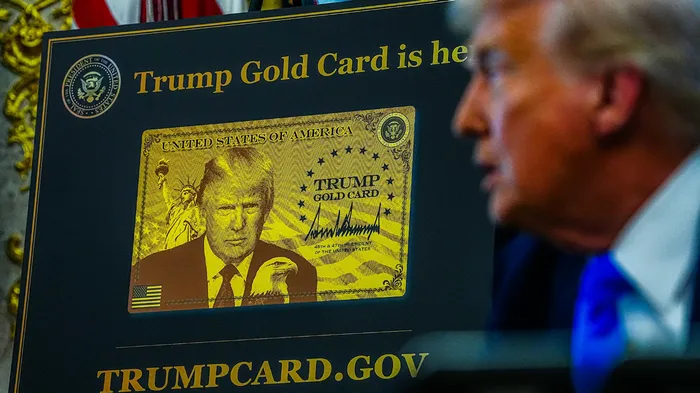
Sitting near a Trump Gold Card sign, President Donald Trump speaks to members of the media in the Oval Office of the White House in Washington, D.C., on Friday, September 19, 2025. Trump is signing a proclamation that would move to extensively overhaul the H-1B visa program, requiring a $100,000 fee for applications in a bid to curb overuse, according to a White House official familiar with the matter.
Image: Getty Images
President Donald Trump on Friday unveiled a brand-new “gold card” visa scheme, offering a fast track to residency for people willing to pay $1 million.
But that wasn’t the only change to immigration policy that the president announced on Friday: Companies looking to attain H-1B worker visas could soon have to pay a $100,000 annual fee for the privilege.
The H-1B visa is used by myriad American companies to hire skilled workers from abroad, but it is particularly beloved by the tech sector. The White House said in a proclamation on its website that businesses have “abused” the system, making it more “difficult to attract and retain the highest skilled subset of temporary workers, with the largest impact seen in critical science, technology, engineering, and math (STEM) fields.”
The changes are likely to be challenged in court, with some critics arguing the rationale for the H-1B changes—to limit the visa’s use—could face legal scrutiny. If the changes do take effect, however, then they could significantly affect how some of the countries’ largest companies operate, from hiring to headquarters locations.
On a brand-new government website, the Trump Gold Card is described as a means to “unlock life in America.”
There are two cards aimed at individuals: One is the Trump Gold Card, which has a $1 million fee and promises applicants can receive U.S. residency in “record time.” The other is a soon-to-be-released Trump Platinum Card, which carries a $5 million fee and would allow recipients to stay in the country for 270 days without being subject to U.S. taxes on income earned abroad.
There is also a business-focused card, called the Trump Corporate Gold Card, which costs $2 million and is aimed at companies that want to sponsor an individual’s bid for U.S. citizenship.Trump touted the gold card on social media Friday: “We anticipate THE TRUMP GOLD CARD will generate well over $100 Billion Dollars very quickly. This money will be used for reducing Taxes, Pro Growth Projects, and paying down our Debt.”According to the cards’ website, all applicants must fill out an application and pay the nonrefundable fee to be considered. Individuals who apply will also be vetted by the State Department and Department of Homeland Security—a process that carries another $15,000 fee—and once approved, they will be granted lawful permanent resident status, similar to green card holders.
U.S. Commerce Secretary Howard Lutnick said the program is still in the “implementation phase,” but that the administration expects to issue around 80,000 gold cards. The program is designed to replace the EB-1 and EB-2 visas, which granted green cards to individuals with “exceptional ability” in the arts, business, science, or other fields.
Under the new rules, U.S. businesses would need to pay a far greater price to hire foreign workers on H-1B visas. Previously, employers could expect to pay several thousand dollars in visa fees, but if these changes take effect, then that is set to balloon to at least $100,000 per year.
The administration said the new fee for worker visas is aimed at cracking down on companies that lean too heavily on foreign workers. “The large-scale replacement of American workers through systemic abuse of the program has undermined both our economic and national security,” the White House wrote in a statement.
Commerce Secretary Lutnick on Friday said that the $100,000 fee could be made annually for six years.
The H-1B visa system was created during the George H.W. Bush administration in 1990. And according to U.S. Citizenship and Immigration Services data, tech companies have benefited most meaningfully from the system.
The businesses with the most H-1B approvals include tech giants such as Amazon (which has more than 10,000 beneficiaries approved), Microsoft, Google, Meta, and Apple, according to USCIS. Around half a million people live and work in the U.S. on an H-1B visa, according to The Washington Post.
While the changes are likely to rattle the companies that rely most on foreign workers, Trump said he believes tech firms will approve of the new program. “I think they’re going to be very happy. Everyone’s going to be happy,” Trump said at the White House on Friday.
ABOUT THE AUTHOR
Sarah Bregel is a writer, editor, and single mom living in Baltimore. She’s contributed to New York Magazine, The Washington Post, Vice, InStyle, Slate, Parents, and others.
